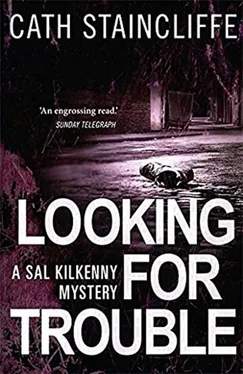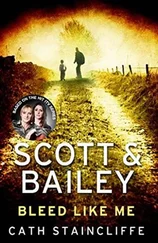I put the letter in my bag, put the load in the washer, put myself in the bath.
Something was worrying me as I lay there. I ticked off in my mind all the things that I knew were worrying me: JB’s death; Janice Brookes’ murder; having to visit Martin’s parents; having to deliver the letter; money – no-one was paying me any, would have to apply for Family Credit again. Still something else. I fished around. Diane? Maddie? Ray? Clive. Yes, it was Clive.
‘You’re pathetic,’ I told myself, as I pulled the plug. But there it was. An unpleasant task waiting to be tackled. And all the worse because it didn’t belong to the big, bad world out there. I couldn’t face it, then come home, safe, and shut the door on it. It was here, in my home. I hated that.
I got ready to leave for Bolton, ignoring the enquiring glances from the dog. Walk? No chance. The phone rang. Maddie had been sick. Would I go and fetch her. Shit. Guilt.
On the way there, I worked out the options. There were two. Stay home with Maddie and put my visit to Bolton off another day, or ask Nana Tello, Ray’s mum, to mind Maddie for a couple of hours. I’d psyched myself up to visit Mr and Mrs Hobbs, but it was hardly urgent. Was it worth grovelling to Nana Tello, who I usually reserved for dire emergencies? She always sent me double messages about minding the kids. She’d hum and haw when asked and complain about their behaviour afterwards, then throw a fit if she heard we’d asked anyone else to mind them. ‘Why don’t you ask me? I’m a grandmother. I never see them.’
I collected Maddie, her face paper-white, dressed in ill-matched spare clothes. Made my apologies. The smell of vomit and disinfectant still lingered in the air. Poor kid.
On the way home, she solemnly related the saga. She’d thrown up three times: in the home corner, by the paints and in the toilet. Now she was tired.
I rang Nana Tello to sound her out. She wasn’t home. Hah! Probably at the bookie’s. She had a passion for the horses and a little flutter made her day. She’d spend hours pouring over the odds and selecting the winners.
Maddie’s not the easiest invalid in the world. Petulant and full of self-pity. Still, I summoned up loads of patience and nursed her through the day. Got plenty of water down her. Resisted her tears when I forbade any biscuits. I heard Clive stirring in the early afternoon. Clattering round the kitchen. Maddie was asleep. I sat quietly in the lounge beside her. The door slammed. He’d left. I wondered whether Ray had said anything to him about the bills, his rent or having a meeting. I doubted it, somehow. I’d have to take the initiative. Later.
The inquest was adjourned, pending further enquiries by the police. It was Detective Inspector Miller who made the formal request that the body be held over. The coroner established that a murder enquiry was in progress and explained to the rest of us that he would not be releasing the body for burial.
There were only a handful of us in the Coroner’s Court. An elderly woman, Janice’s mother, sat with a younger black woman; a social worker, perhaps, or a neighbour. No sign of her sister. There were a couple of reporters, notebooks in hand, and Sergeant Boyston hovering at the back.
Miller flashed me a look of impatience. I pretended not to notice. He was impeccably dressed, crisp striped shirt and tie, navy gabardine. Looked more like an executive than a policeman.
The old-fashioned court, with its heavy oak pews and benches, and green and white tiled walls, lurked in the depths of the Old Fire Station on London Road, opposite Piccadilly Station ramp. It created just the right atmosphere for judging sudden and suspicious death.
We were instructed to rise and the Coroner left the court. People filed out. I hung back. I wanted to speak to Mrs Brookes, but not in the court. If I could find out where she lived…As I stepped through the door into bright sunshine, a hand on my arm made me jump. ‘Miss Kilkenny.’ It was Miller. I jerked my arm away. ‘I understood you were taking a break from all this.’
‘I am, it’s just, I wanted…’ Out of the corner of my eye, I watched Mrs Brookes and her companion cross the road to the central reservation, towards the stairs leading up to the train station.
‘We don’t take kindly to interference in police matters.’ He stared through his tinted designer specs. ‘I thought I made that plain.’
‘I’m not interfering.’ The two women disappeared up the stairwell.
‘I hope not. There are charges we can bring; obstruction, for example.’
‘I’ve just come for the inquest, that’s all. There’s no law against that, is there?’
‘As long as we understand each other.’ He moved away abruptly, followed by Boyston. Once they’d turned the corner, I hurried over the road and climbed the steep steps, two at a time. Had Mrs Brookes come by train? I hoped not. I could end up in Milton Keynes for all I knew. At least if they were driving, I could turn back if it looked like a long distance.
I emerged onto the top of the ramp and looked around. There they were, black hair and white hair, walking slowly towards the car park. Bingo. I was also parked there. I fumbled with the locks on the Mini while I watched to see which was their car. Should I go over now? Introduce myself? Just then, I saw Mrs Brookes raise her hands to her face and start to cry. The younger woman put her arms round her. I couldn’t barge in on that. The women parted and got into the black Datsun. I started my engine and followed them out of the car park. The young woman drove quickly. Easy enough to trail through town, but would I lose her later? She led me through Salford, along the M61, and off onto the A666, the road to Bolton.
Road-works slowed the traffic and it was easy to keep the Datsun in view. We left the motorway and took the dual carriageway into Bolton town centre. Round the maze of the one-way system, then out along an arterial road. Farms and moorland in-between the villages.
We entered the next one-street village and the Datsun drew up in front of the terraced row on the left. A little way ahead was a row of shops. I parked outside the chippie and watched in my rear-view mirror as the driver helped Mrs Brookes from the car and supported her up the steep steps into the terrace house. Red gate. I walked back along the road and noted the number. Thought about knocking on the door. The woman had just been to her daughter’s inquest. I’d return another day to ask my questions.
I bought fish and chips in the little shop, wrapped in newspaper (I’m not a real vegetarian – it’s just meat I won’t eat). Found Chorley cakes and a milkshake in the newsagents next door. I drove up the road onto the tops and found a place to stop. It was windy. A clump of thorn bushes grew sideways, showing which way the wind blew. I was on the ridge between two valleys. Behind me lay the town, rows of redbrick terraces, sections of wasteland where they’d been cleared, new industrial estates, old mill chimneys. I could just make out Le Mans Crescent with its ornate public buildings sand-blasted to their former glory.
In the valley ahead nestled a few farms, scattered villages and the moors. I gazed at them while I ate my lunch. The fish and chips were classic: crisp batter, moist flakes of cod, large chips freshly fried. The Chorley cake, all sweet spicy fruit and oily pastry, needed washing down with the milkshake. My blood sugar level and no doubt my cholesterol level soared. I felt sleepy. But I had work to do. I was in the area. I had no excuse. I consulted the A-Z and worked out my route to twenty-three Glover Street.
He opened the door. Dark hair dashed with grey; holiday tan. A pleasant face, square jaw, laughter lines. Marks and Sparks cardigan and slacks.
Читать дальше












